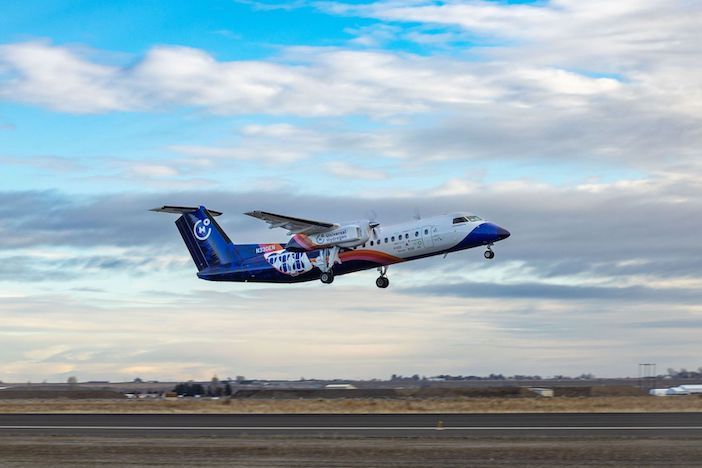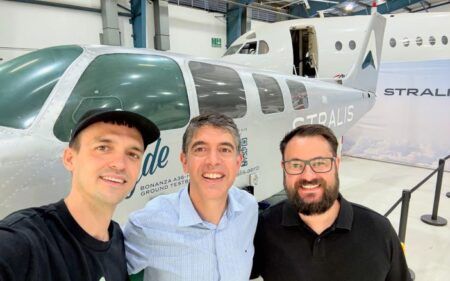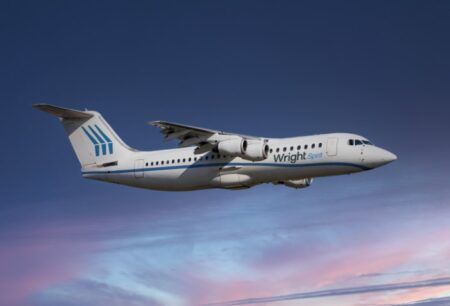Universal Hydrogen has flown its Dash 8 test aircraft powered by a hydrogen fuel cell for the first time.
The 15 minute flight from Grant County International Airport in Moses Lake, Washington took place on March 2 and reached an altitude of 3,500ft.
The Dash 8, named Lightning McClean becomes the largest aircraft yet to fly powered by a hydrogen fuel cell, following ZeroAvia’s first test flight with fuel cell modified-Dornier 228 during January in the UK.
Universal’s flight, which was conducted under an FAA Special Airworthiness Certificate, signals the start of a two-year flight test campaign. The company plans for fuel cell-converted ATR 72 regional aircraft to enter into passenger service in 2025.
For the test flight one of the Dash 8’s engines was replaced with a fuel cell-electric, megawatt-class powertrain, while the other remained a conventional engine for safety.
A “megawatt-class” powertrain suggests a higher capacity fuel cell system than that used by ZeroAvia during its flight test. ZeroAvia has said its first powertrain will have 600kW capacity and be suitable for aircraft of up to 20 seats, while Universal has said its Dash 8 can carry up to 40 passengers.
Universal’s test aircraft was piloted by pilot Alex Kroll. He said, “During the second circuit over the airport, we were comfortable with the performance of the hydrogen powertrain, so we were able to throttle back the fossil fuel turbine engine to demonstrate cruise principally on hydrogen power.
“The airplane handled beautifully, and the noise and vibrations from the fuel cell powertrain are significantly lower than from the conventional turbine engine.”
Universal Hydrogen’s powertrain is built around Plug Power’s ProGen family of fuel cells which have been modified for aviation use. The powertrain is configured so that the fuel cells drive the electric motor directly without any batteries.
The motor and power electronics used in the powertrain was a magni650 electric propulsion unit supplied by Everett, Washington-based magniX.
Seattle-based AeroTEC assisted with engineering, including the design of the modified nacelle structure, aircraft systems design and integration, as well as aircraft modifications and installation of the powertrain onto the flight test aircraft. The engineering development and airframe integration was carried out in less than 12 months.
Universal Hydrogen is also developing a modular hydrogen logistics system to supply hydrogen to airports and its customer’s modified ATR 72s.
Paul Eremenko, co-founder and CEO of Universal Hydrogen said, “Our business model resolves the chicken-and-egg problem between hydrogen airplanes and hydrogen infrastructure by developing both in parallel and with a uniquely low-cost approach,”
“The airplanes are converted to hydrogen using an aftermarket retrofit conversion kit, tackling the existing fleet rather than developing a brand new airplane. And hydrogen fueling uses modular capsules compatible with existing freight networks and airport cargo handling equipment, making every airport in the world hydrogen-ready.”
Connect Airlines from the US and French airline Amelia are the launch customers for the hydrogen conversion. According to Universal it has booked 247 aircraft conversions from 16 customers worldwide, worth US$1 billion.
Connect Airlines plans to begin operations in the coming months between Toronto, Canada and Midwest and northeast US cities with a fleet of regional turboprop aircraft. The airline has placed an order to convert up to 100 ATR 72-600 aircraft.
John Thomas, CEO of Connect Airlines said, “We have committed to being North America’s first zero-emission airline and this historic flight, taking hydrogen, which can be made with nothing but sunshine and emitting only water, is a key milestone on our journey,” continued Thomas.
Alain Regourd, president of Amelia said, “With this technology, and the improvement of government positive regulations I am confident that we can turn the tide of public sentiment and once again make aviation a shining beacon of technological optimism,”





